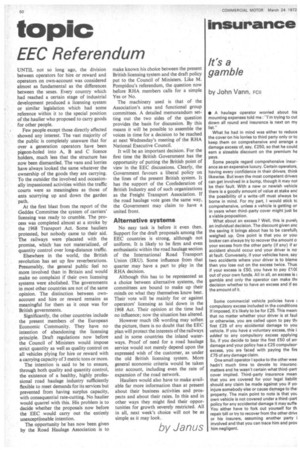insurance
Page 52

If you've noticed an error in this article please click here to report it so we can fix it.
It's a gamble
by John Vann, FCII
• A haulage operator worried about his mounting expenses told me : "I'm trying to cut down all round and insurance is next on my list."
What he had in mind was either to reduce the cover on his lorries to third party only or to keep them on comprehensive and arrange a damage excess of, say, £250, so that he could earn a sizeable discount on the premium he pays.
Some people regard comprehensive insurance as an expensive luxury. Certain operators, having every confidence in their drivers, think likewise. But even the most competent drivers can get involved in a bump, though it may not be their fault. With a new or newish vehicle there is a goodly amount of value at stake and the possibility of a write-off must always be borne in mind. For my part, I would stick tc comprehensive, unless a vehicle is getting or in years when third-party cover might just be a viable proposition,
What about an excess ? Well, this is purely an individual decision. The discount given anc the saving it brings about has to be carefully weighed up. One point is that you or youi broker can always try to recover the amount o. your excess from the other party (if any) if ar accident should occur and your driver is no' at fault Conversely, if your vehicles have, say two accidents where your driver is to blame then you lose out on the excess twice. Thus if your excess is £50, you have to pay £10C out of your own funds. All in all, an excess is gamble and only the operator can make thc decision whether to have an excess and if so the amount of it.
Some commercial vehicle policies have compulsory excess included in the conditions If imposed, it's Likely to be for £25. This mean: that no matter whether your driver is at faul or otherwise, you are called upon to pay thi first £25 of any accidental damage to you vehicle. If you have a voluntary excess, this i. added to any compulsory excess applying So, if you decide to bear the first £50 of an. damage and your policy has a £25 compulsor excess, you are faced with paying the firs E75 of any damage claim.
One small operator I spoke to the other wee hadn't much time to devote to insurano matters and he wasn't certain what third-part cover implied. Third-party insurance mean that you are covered for your legal liabilit should any claim be made against you if yo' injure somebody else or cause damage to thei property. The main point to note is that you own vehicle is not covered under a third-part policy for any accidental damage it may suffe You either have to fork out yourself for th repair bill or try to recover from the other drive or his insurers, assuming another party i involved and that you can trace him and prov him negligent.




















































































































































